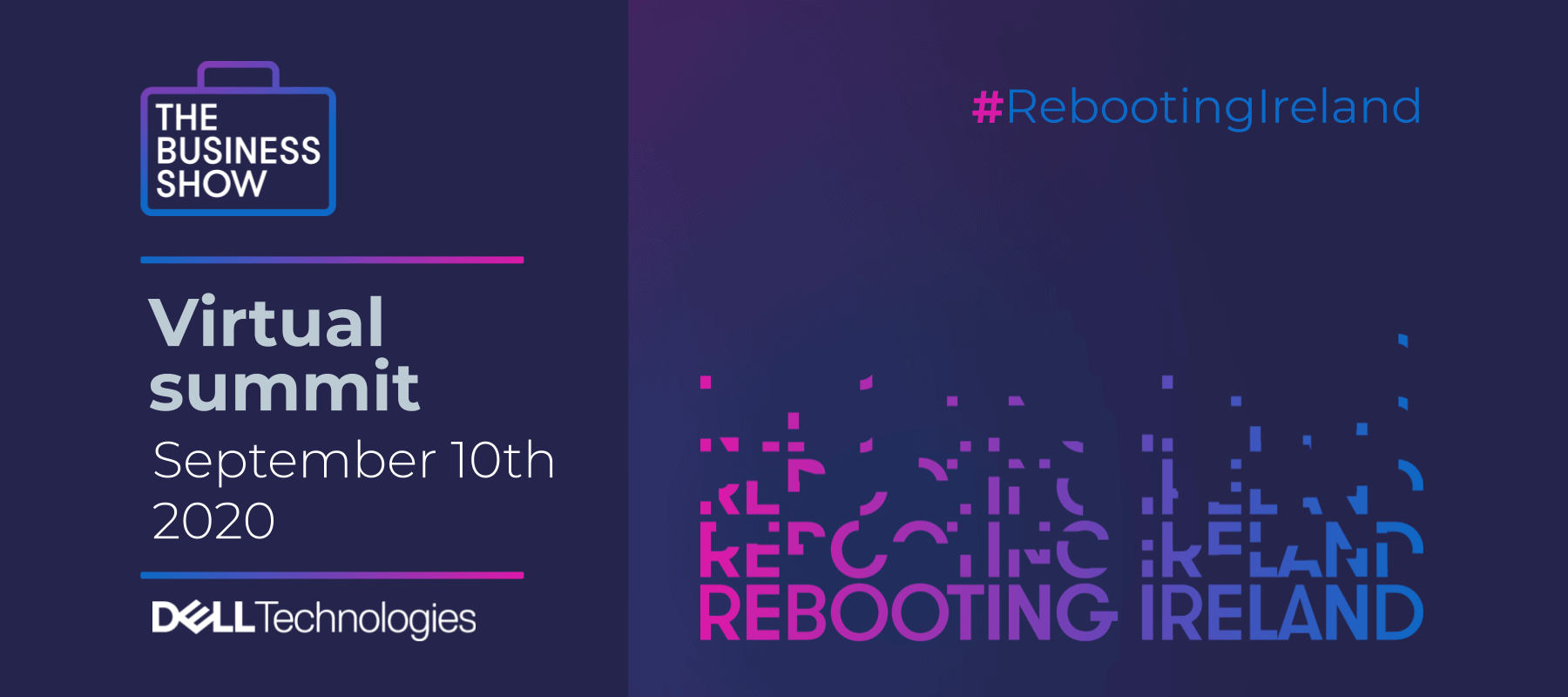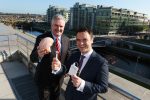Launched by the Business & Finance Media Group, The Business Show centred on the theme of ‘Rebooting Ireland’ and brought together leaders from business and politics in Ireland
Launched by the Business & Finance Media Group, The Business Show’s virtual summit took place on September 10th, and centred on the theme of ‘Rebooting Ireland.’ Leaders from business and politics in Ireland came together to engage with themes of Resilience, Strategic Growth, Innovation & Diversification, Digital Transformation, The Future of Work, Financial Planning & Funding, Human Resource Management & Upskilling, Business Process Optimisation, Business Continuity, International Expansion and Sustainability.
The Business Show trended on Twitter with both national and international audiences all throughout the day. The 1,300 registered attendees included a diaspora audience from countries including Canada, Australia, China, India, USA, who were witness to 22 exhibitors, 80+ speakers, 24 speaking sessions. There were in total 700 networking connections, with 50+ news articles from various media outlets covering the event.
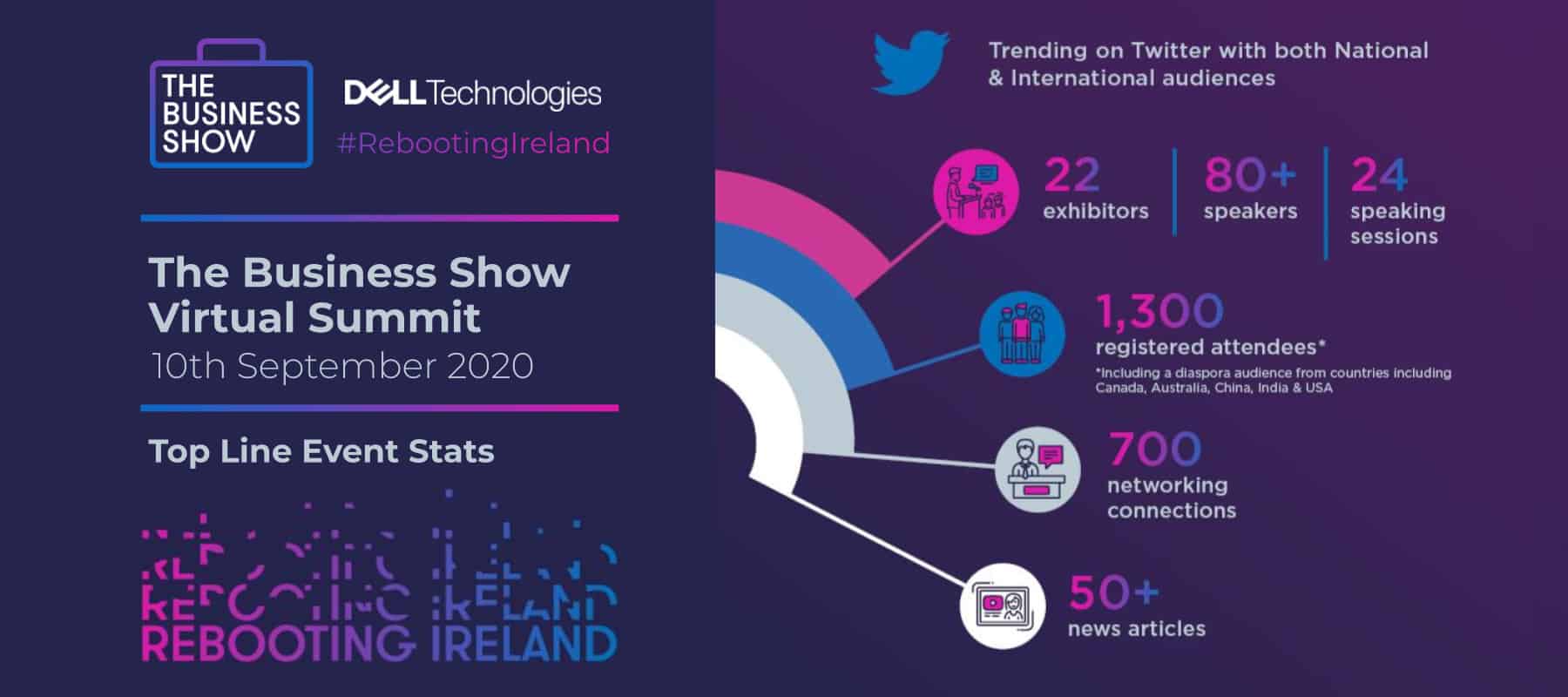
The Business Show – Event statistics
The Business Show offered stories of resilience through turbulent times, shaped strategies for success in the future and provided a global platform for businesses and leaders to share their story on the next steps for growth in the post-COVID era. On September 11th, Business & Finance published 8 key takeaways from The Business Show’s virtual summit. Below are further insights from the event.
Culture and employee well-being are important in modern day organisations
Tomás Sercovich, CEO, BITCI, opened a discussion on the importance of culture and employee well-being in modern day organisations by saying, “if I ask large companies what their biggest concern is, it’s people minding people.” The sentiment was shared by panelists Sarah Cunningham, Mastercard, Shauna Moran, Operate Remote, and Cheryl Roubain, Greenhouse Software.
Ms. Cunningham stated that she takes a “holistic view” across their operation at Mastercard: “We have 700 employees today – great diversity in backgrounds, age, etc,” she said. When this crisis first hit, and people were mandated to work from home, she noted that some people found it suited them, while others might have struggled. How did Mastercard respond? “What was taken away was choice. We should take lessons from this challenge in the future. There are three factors that have led to success: Partnership, empowered community, and strong executive leadership.”
There are three factors that have led to success: Partnership, empowered community, and strong executive leadership.
By showing strength in leadership, and catering to the needs of individual employees, Mastercard overcame challenges posed by lockdown: “We have many groups that are employee led. When we moved to the virtual world, so many of my colleagues went above and beyond to allow our community to thrive … We’re aiming to create a culture with decency at its core.”
Ms. Moran echoed Ms. Cunningham’s position on the importance of leadership in developing a strong culture: “With OperateRemote … We help companies develop their leaders. It’s not a normal remote working situation happening right now. We’ve found that there has been a difference in challenges in the last few weeks … We find there’s two differences with companies: Some are struggling to live, and [some] are struggling to work, to focus.
“As individuals, we need to invest the time and energy into … how to sustain ourselves. That mutual responsisbility is important. What does well-being actually look like to our team? It’s important for companies to put culture at the centre of what they do.”
Ms. Roubain noted the importance of keeping in touch with employee well-being: “How do you engage and retain employees during a pandemic? For us, what we ended up doing, is going back to basics, good people practices – checking in with employees. Not just to ask how work is doing, but how the human is doing. How often are you having all-hands meetings, how often are you seeing everyone? … Give employees permission to disengage.”
Go back to basics and broaden your talent pool to maintain, sustain and accelerate growth in your business
Gary Leyden, Commercial Director, NDRC, moderated a panel discussion on ‘Grass roots – What is required to maintain, sustain and accelerate growth in your business.’ He was joined by Joe Blake, Unity Technologies, Devan Hughes, Buymie, and Vanessa Tierney, Abodoo.
Mr. Hughes instigated the conversation by stating that growth is a really broad spectrum: “It’s broad in the sense that it’s nuanced across the type of business that you’re in, and in terms of the stage. So when I think back to the early days of Buymie, we focused on the core transaction – whether you’re B2B or B2C, that transaction is fundamental.”
Mr. Blake suggested going back to basics before pursuing growth in a post-COVID world: “I always go back to your business plan. In that, you’ll have key milestones mapped out. What I’ve always done with the board and the management team is make that very visual, very clearly-defined. Make it as descriptive as it possibly can be.”
Where we are now in terms of remote working is where we predicted we would be in a decade.
Adding to these key points, Ms. Tierney suggested using an increased, and in many cases, newfound global outreach – occuring as a result of digitisation – to widen your talent pool: “Where we are now in terms of remote working is where we predicted we would be in a decade. There were a lot of blockers: technology, trust, culture, management who had been in a role for perhaps 20 or 30 years.
“Obviously, people are now getting used to this idea of flexibility, so we no longer have to do the education piece, so it allowed us to accelerate and see an opportunity. 400 million people have lost jobs globally since March. We have to get really smart about broadening talent pools, getting people to work. Fundamentally, if they have connectivity and somewhere to work, we should have an inclusive working model.”
The re-imagined future of work will be a hybrid model of work-from-home and physical location
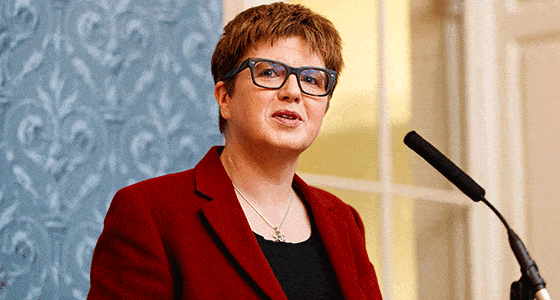
Margot Slattery, Sodexo
Margot Slattery, Sodexo, John Goulding, Workvivo, and Mary Connaughton, CIPD Ireland, joined moderator Shauna Moran, Operate Remote, in a discussion on what the re-imagined future of work will look like.
Ms. Slattery noted the importance of retaining a physical office space, even in a post-pandemic world: “It’s important that we don’t dismiss the idea of a physical location and co-location,” she said. “Flexible working was there beforehand, it’s just accelerated.”
At some point we have to stop talking about remote working and start talking about flexible or customised working.
Echoing Ms. Slattery’s point was Mr. Goulding, who said that Workvivo had surveyed 1000 people working from home since the pandemic started. According to their report, a hybrid model as suggested by Ms. Slattery is necessary to maintain employee satisfaction and well-being: “52% of people don’t want to go back to the office, 36% would like a hybrid, only 12% would like to go back to the office. 90% said they would stay with their current employer if their employer is willing to retain working from home.”
“Personalisation has been accelerated over the last number of months … At some point we have to stop talking about remote working and start talking about flexible or customised working,” Ms. Connaughton added.
Planning for growth in a post-COVID world need not be slowed by remote working
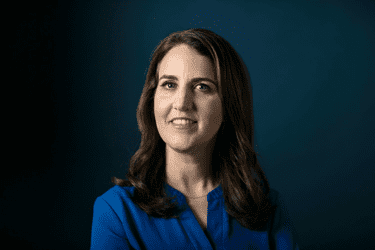
Fidelma McGuirk, Payslip
Fidelma McGuirk, Payslip, Wendy Oke, TeachKloud, and Suzanne Rigby, Click and Collection, joined moderator Eileen O’Mara, Stripe, in discussing how to plan for growth in a post-COVID world.
According to Ms. McGuirk, the first benefit for Payslip in terms of the sales cycle was, prior to COVID, that a few stages of the sales process were already remote. However, at a certain point, they were always expected to meet clients in person: “That point of having to meet them is just gone,” she said.
What we are building is the technology, nobody cares where it comes from.
Planning for growth need be hindered by remote work. She continues: “What we are building is the technology, nobody cares where it comes from. It has freed up this concept that when you need to get to that CFO or get to that final decision-maker stage, you need to meet them. Everyone understands that you can get due diligence done remotely.”
Ms. Oke’s product, for example, has seen an increase in use in recent months: “We got a lot of customers who are now looking at using a cloud-based management system for their early-childhood service or after-school service because you now have a lot of parents who can’t necessarily come into the school. They can’t come in to sign policies or documents. So there has been an increased need for our product.”
The 2nd edition of The Business Show, “Workforce Evolution,” focusing on the Future of Work, will take place in the first week of December 2020.
On demand content from The Business Show will be available for the next 90 days. You can register here to receive it.
